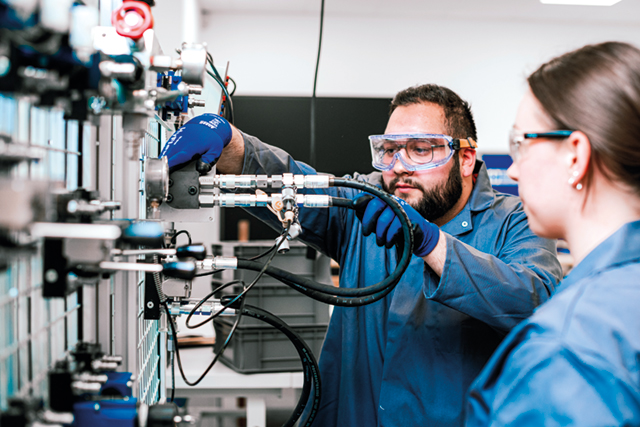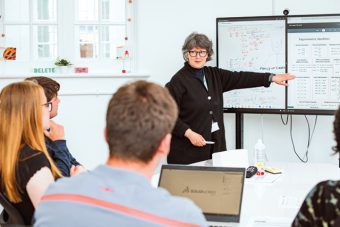

Hereford’s New Model Institute for Technology & Engineering is seeking to solve key skills challenges through mould breaking approaches to education. News Editor Steve Dale found out more in an interview with NMITE’s Chief Academic Officer, Professor Beverley Gibbs.
Development of employment-ready engineers equipped with the skills and experience to tackle talent shortages and address critical national and global challenges is the primary mission of the New Model Institute for Technology & Engineering (NMITE).
Following its inauguration in 2018, the Hereford-based higher education institute welcomed the first ‘pioneer cohort’ of students to its Integrated Engineering Undergraduate Master’s Degree programme in September last year.
The approach to learning on the three year course deviates significantly from traditional engineering degrees; participants are expected to ‘learn by doing’ and gain experience on real projects, rather than sitting through lectures and exams.
In support of efforts to recruit students from a wide range of different backgrounds, it also does not require those joining to have a Maths or Physics A-level, as these subjects are taught within the curriculum.
“Our general philosophy is to be an impactful centre for mould breaking engineering and technology education,” explains NMITE’s Chief Academic Officer, Professor Beverley Gibbs.
“We don’t teach engineering as an abstract body of theory and it is one of our guiding principles that we never will. We are only offering courses that are immersed in real life professional, social environmental and ethical context.” She adds: “Equally, we integrate partners, employers and community organisations into our teaching.”

A BEng in Integrated Engineering is also set to be offered by the institute, as well as sustainable Built Environment short courses, while a second campus is currently under construction in Hereford which will feature a Centre for Advanced Timber Technology and a Centre for Automated Manufacturing.
Preparing the profession
As most professionals across engineering will be aware, skills in a number of emerging disciplines – including environmental and digital engineering – are increasing in demand while dealing with uncertainty remains a key challenge for the future.
“We know that sustainability is a huge issue in engineering, and we know that young people care about it,” says Professor Gibbs. “We’re happy to see professional engineering institutes moving on in their thinking, from environmental impact being a constraint on engineering operations to a guiding framework of innovation which can carry its own opportunities.”
Digitalisation of assets, business processes and operations, she adds, is also set to disrupt the work of engineers and the skills they will need.
To help account for emerging future skills needs, Professor Gibbs says NMITE aims to teach in a way that is “connected across disciplines and to society”, and that equips its graduates for a future in which they are likely to have to ‘reskill’ several times.
Increasing diversity
A further key focus for NMITE is to help improve gender diversity within engineering. Professor Gibbs says this is important not only because there are not currently enough engineers to address pressing challenges, but also because diverse voices are crucial for solving problems in a way that benefits the breadth of society.
She adds: “We commonly say that engineers build the world. If that is true then the question of who is doing this building becomes very important – how has their experience shaped their vision? What kinds of problems do we end up addressing, and which do we ignore?
“We need to be able to draw on different thinking – cognitive diversity is massively important in problem solving and creativity.”
NMITE has pledged to recruit a gender-equal student population and recently announced a scholarship scheme whereby female students joining its Master’s Degree course this September will receive £3000, on top of a £2000 bursary offered to all students regardless of gender or background.
Maintenance training
Professor Gibbs also discusses the value of maintenance engineering projects in teaching future professionals, and calls on employers to propose interesting maintenance themed projects to universities that students can work on.
“Maintenance engineering is a great context through which to bring engineering to life apply a wide range of curriculum topics,” she explains. “As educators, we often rely too heavily on product design tasks to bring the engineering curriculum to life, but many industrial placement year students I’ve mentored are immediately put to work on maintenance and test projects.”
nmite.ac.uk | t: 01432 371111

